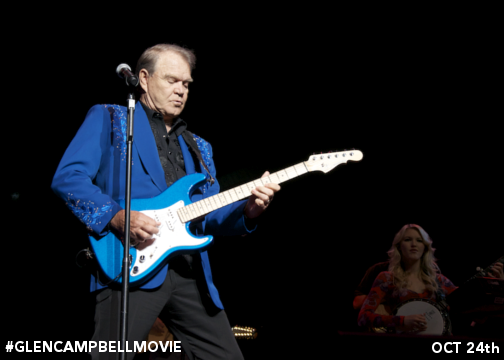Is Glen Campbell Alzheimer’s documentary exploitive?
Posted on September 29, 2014 By Derek Owen Entertainment, Film, Front Slider, life, Music
 Director James Keach’s documentary Glen Campbell: I’ll Be Me follows the country music legend’s farewell tour following his diagnosis of Alzheimer’s Disease in the summer of 2011.
Director James Keach’s documentary Glen Campbell: I’ll Be Me follows the country music legend’s farewell tour following his diagnosis of Alzheimer’s Disease in the summer of 2011.
While chock full of joyful moments, it’s hard to watch the rapid descent of the great musician into dementia, as documented during a scene at the Mayo Clinic in Rochester, MN. Glen, looking disoriented, admits he doesn’t know what day or month it is. He is unable to answer any of the doctor’s questions, weakly insisting that those things are unimportant to him. You have to ask: As helpful this film might be to people who have family members with Alzheimer’s, would Glen really have wanted to be seen this way?
His act is not fooling anyone, let alone his backing band, staffed with three of his children, or his publicist, who breaks down on camera discussing her reservations about the tour. She was worried the tour would crumble. The 104-minute film manages to document how, for the most part, it doesn’t. There was clearly more than a little artistic license taken here, but we get the very basic point: Despite all the stress and unpredictability of managing Glen’s condition, and not knowing if or when it was all going to fall apart, all the people around him somehow manage to see the positive in the situation, pull together, and cope.
There is some insight from one of his doctors who says Glen’s disease may not have been progressing as fast because his immense musical gifts are slowing the rate of brain atrophy. In more than a few clips of the tour, he manages somehow to rattle off some voracious soloing, staying mostly in time and (perhaps surprisingly) in tune … until that fateful concert everyone expects, but no one wants to happen. Still, despite his slips, no one from from Paul McCartney to Bruce Springsteen to countless country legends dispute that this man is one of the true greats of American music.
Keach has been quoted as saying his movie is “a triumphant journey of a guy who was told to hang up his guitar, when he was diagnosed with Alzheimer’s, and he said ‘no, I’m going to celebrate my life, and I’m going to do it with my family.’”
 You have to wonder about that. Can a guy who doesn’t even remember the names of his children be able to truly consent to being portrayed in this way? Is he really in a position to say no? Was it in his best interests to do the tour? Given clips of his playing, the meticulousness of the support he was being given by everyone, and how playing music seemed to make him feel, the answer has to be yes.
You have to wonder about that. Can a guy who doesn’t even remember the names of his children be able to truly consent to being portrayed in this way? Is he really in a position to say no? Was it in his best interests to do the tour? Given clips of his playing, the meticulousness of the support he was being given by everyone, and how playing music seemed to make him feel, the answer has to be yes.
But being the subject of movie? Not so much.
His family and friends all say the right things, seem honest and earnest, but curious viewers have to ask themselves: If you were in a similar state, would you want your wife to tell the whole world that you pee in the corner of my bedroom because you no longer know where the bathroom is, that a high dose of one of your medications makes you horny all the time, or that you’re threatening your kids with golf clubs in angry delusional states? I’d want my family to respect my privacy and dignity first and foremost, whether or not what I’m doing is consistent with the course of this terrible disease or not – and this documentary comes off as exploitative.
Glen Campbell was a musician with a rare gift to connect with others via song. It sounds like fans were satisfied seeing him live in concert one last time, and frankly, for the sake of the man’s dignity, it should have been left at that.
(This documentary was filmed two years ago; Campbell is now residing in a supported living facility for individuals with Alzheimer’s.)
(Link to Alzheimer Society of Canada)











